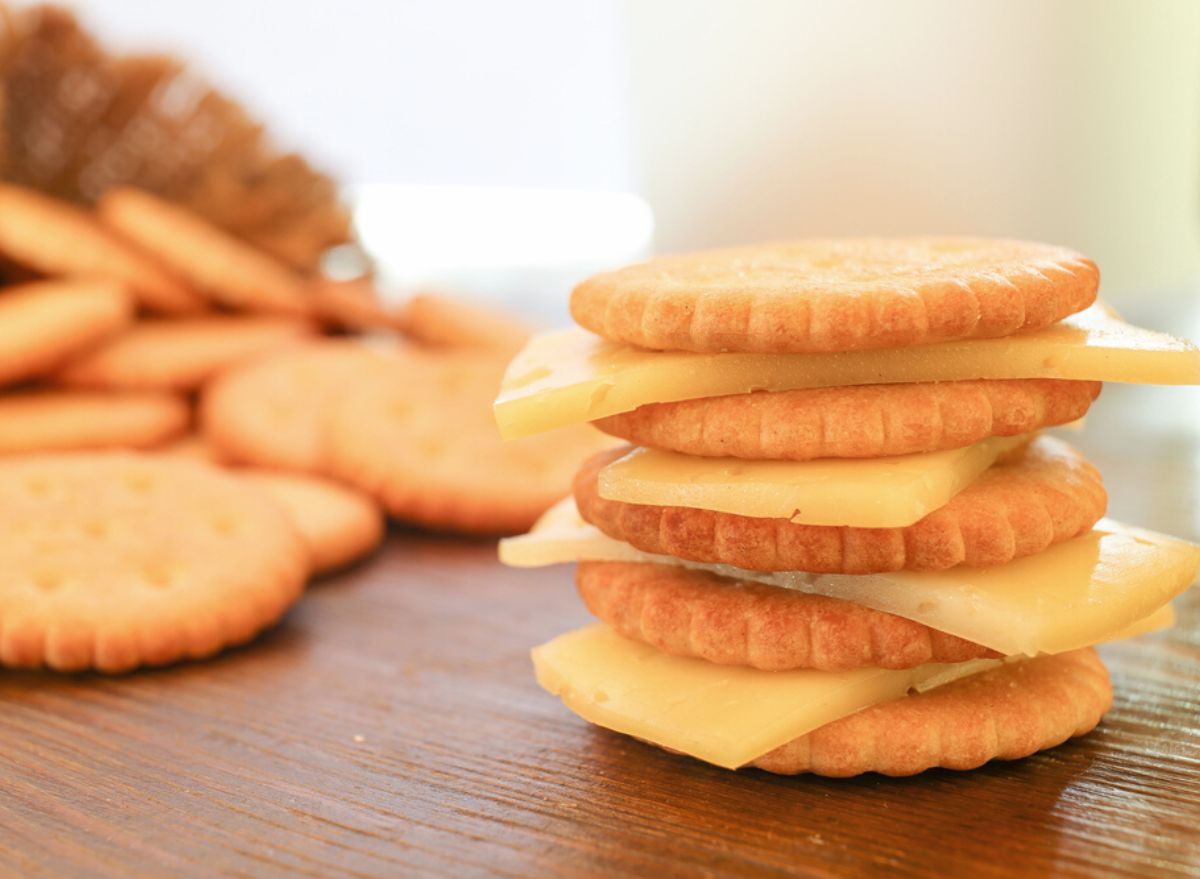The product recommendations in this post are recommendations by the writer and/or expert(s)
interviewed and do not contain affiliate links. Meaning: If you use these links to buy
something, we will not earn a commission.
If you need a quick and cheap snack on the go, crackers are an excellent choice. You can also dress up any type of charcuterie board with your favorite type of cracker, or crumble them up and use them in various casserole recipes. However you like to eat them, it can be universally agreed upon that these convenient snacks can be quite satisfying. However, some are much worse for you than others.
When thinking of the kind of cracker you want, your mind may go to something that is both delicious and full of nutritional value. This means crackers that are higher in fiber and protein to help keep you full, and made with whole grain ingredients to add a nutrient boost. Unfortunately, many of the popular, affordable cracker brands are lower in fiber and protein and made with heavily processed ingredients.
To learn more about the brands that aren’t the best for you, we talked with a handful of expert dietitians to get their recommendations on the worst cracker brands in grocery stores right now. Read on to see which ones you may want to avoid, and for more helpful grocery shopping tips, check out The 23 Best Healthy Foods To Buy at Target, According to Dietitians.
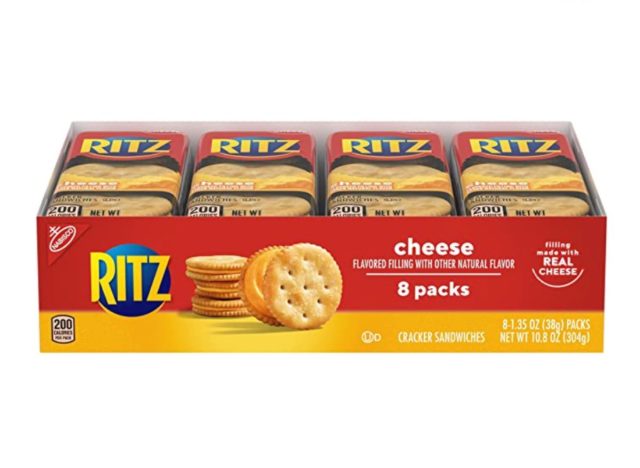
Per pack: 200 calories (38 g), 11 g fat (3 g saturated fat), 310 mg sodium, 22 g carbs (0 g fiber, 5 g sugar), 2 g protein
Ritz crackers are a popular snack, and these cheese sandwich packs make for an easy, accessible food to throw into your lunch when you’re rushing out the door. However, the nutritional value of these is less than appealing.
“Per one snack pack there are 200 calories, 11 grams of fat, 3 grams of saturated fat, 22 grams of carbs, 5 grams of sugar, 0 grams of fiber, 2 grams of protein, and 310 milligrams of sodium,” says Toby Amidor, MS, RD, CDN, FAND award-winning nutrition expert and Wall Street Journal bestselling author of The Family Immunity Cookbook. “These crackers are made with minimal fiber and are filled with semi-soft cheese powder, and there are a lot of calories and 15% of the recommended amount of saturated fat, which is quite high for just a snack.”
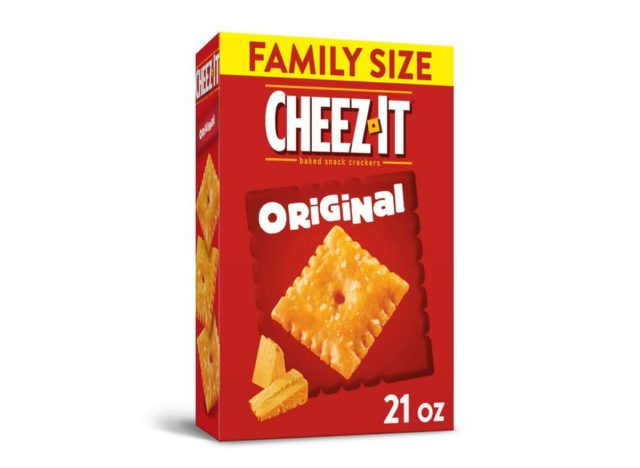
Per 1 pouch (42 g): 210 calories, 11 g fat (2.5 g saturated fat, 0 g trans fat), 320 mg sodium, 24 g carbs (<1 g fiber, 0 g sugar), 4 g protein
With 8 grams of fat, 1.5 grams of saturated fat, 230 milligrams of sodium, and less than one gram of fiber, don’t let the fact that Cheez-Its are baked fool you into thinking these are healthy. They may be delicious, but “These are loaded with sodium and are fairly high in calories as far as crackers go,” says Lisa Young, PhD, RDN, author of Finally Full, Finally Slim and member of our Medical Expert Board. “They also contain refined grains and saturated fat, so I suggest skipping them.”
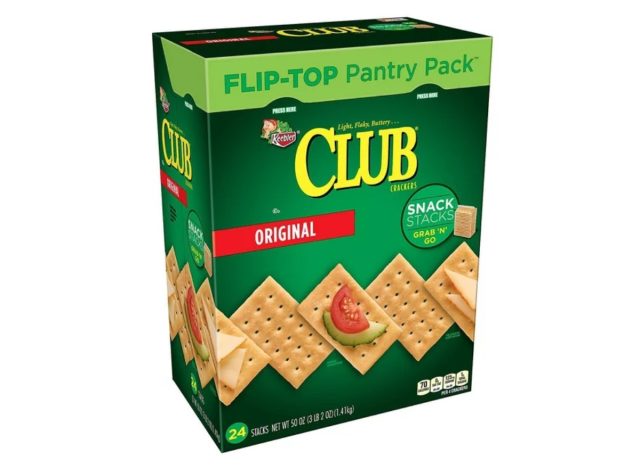
Per 4 crackers (14 g): 70 calories, 3 g fat (0 g saturated fat, 0 g trans fat), 125 mg sodium, 9 g carbs (0 g fiber, 1 g sugar), <1 g protein
According to Amidor, just 4 Keebler Club Crackers gives you 3.1 grams of total fat, 0.5 grams of saturated fat, 0 grams of fiber, and 0.8 grams of protein.
“The nutrition info isn’t bad, however, it’s the ingredient list that includes several types of added sugars, like high fructose corn syrup, that just isn’t the healthiest,” advises Amidor. Instead, she suggests finding a higher-fiber cracker that is lower in added sugars as well.
In fact, getting enough fiber throughout your day is crucial for things like regular digestion, weight management, blood sugar management, and better heart health, and making sure that you’re snacking on fibrous foods can help you reach your daily fiber goals.
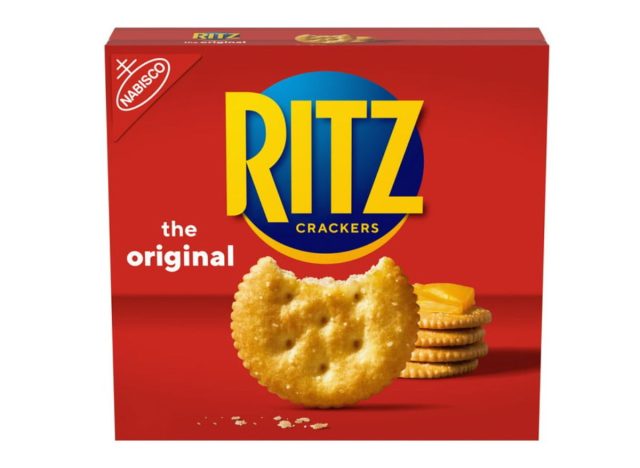
Per 5 crackers (16 g): 80 calories, 4.5 g fat (1 g saturated fat, 0 g trans fat), 130 mg sodium, 10 g carbs (0 g fiber, 1 g sugar), <1 g protein
Similarly to the cheese sandwich packs, the original Ritz crackers are also low in nutrients and higher in some unwanted ingredients.
“Ritz crackers are a highly-processed food that are typically made with refined wheat flour, vegetable oil, and added sugars, and they are also low in fiber and protein, which can make them less satisfying and may contribute to overeating,” says Trista Best, MPH, RD, LD, at Balance One Supplements. “While it’s fine to enjoy Ritz crackers in moderation as an occasional snack, they should not be relied on as a major source of nutrition in the diet. Opting for whole-grain crackers or other nutrient-dense snacks like fresh fruits and vegetables is generally a better choice for overall health and wellbeing.”
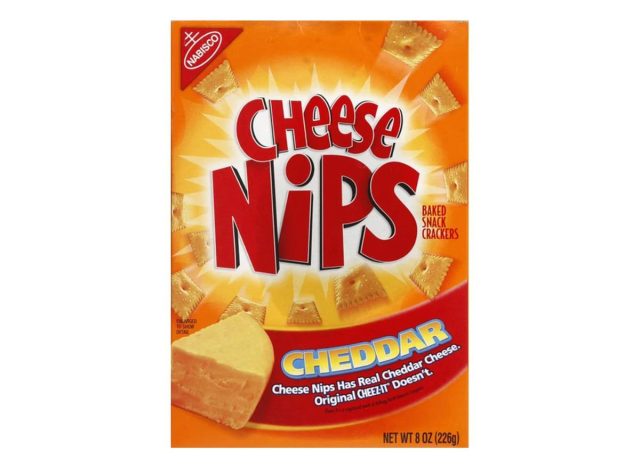
Per 29 crackers (30 g): 150 calories, 6 g fat (0.5 g saturated fat, 0 g trans fat), 210 mg sodium, 19 g carbs (0 g fiber, 0 g sugar), 3 g protein
Another popular option for throwing into your lunch pack or eating on an afternoon break, Cheese Nips are notoriously savory but not the best when it comes to nutritional value.
“The calories and total fat in Cheese Nips are on the higher side,” says Amidor. “There is also a bit of sodium, at around 9% of your total recommended daily maximum.”
“Instead, I would recommend a higher-fiber cracker or one that doesn’t have as much fat added, and top with peanut or almond butter,” she adds.
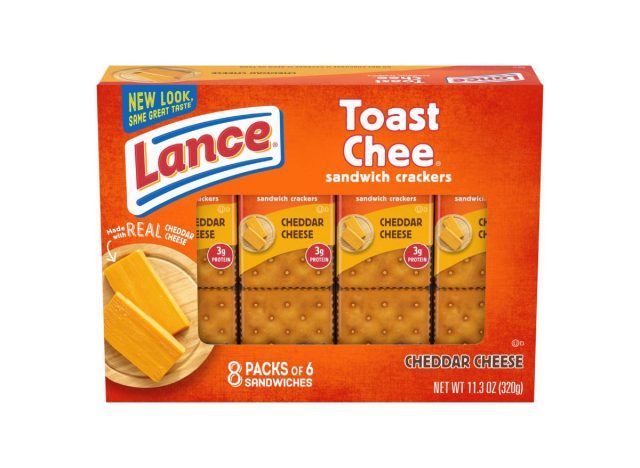
Per 1 package (40 g): 200 calories, 11 g fat (3.5 g saturated fat, 0 g trans fat), 400 mg sodium, 24 g carbs (<1 g fiber, 4 g sugar), 3 g protein
In just one pack of ToastChee, you’re getting 400 milligrams of sodium. This is about 17% of the FDA‘s daily recommended max, which for just one snack is quite a lot.
“Like many processed snack foods, ToastChee Cheddar Sandwich Crackers are low in fiber and protein, and high in sodium,” says Best. “This combination can contribute to a host of chronic health concerns including weight gain, hypertension, and chronic inflammation.”
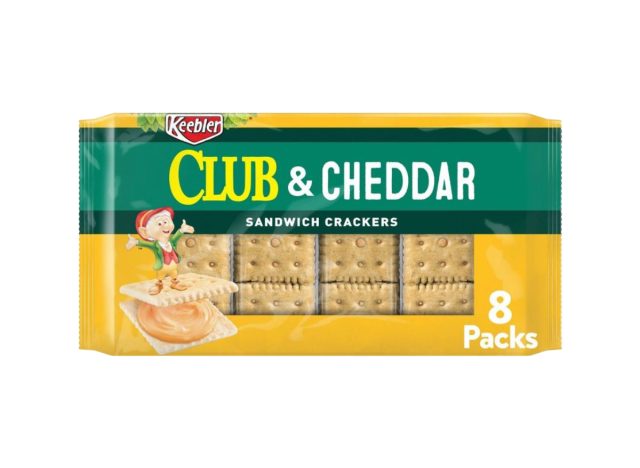
Per 1 package (39 g): 190 calories, 9 g fat (2.5 g saturated fat, 0 g trans fat), 310 mg sodium, 24 g carbs (<1 g fiber, 5 g sugar), 3 g protein
Unfortunately, these yummy sandwich crackers from Keebler may satisfy your snack cravings, but with 9 grams of fat, 2.5 grams of saturated fat, 310 milligrams of sodium, and less than one gram of fiber, the nutritional of these isn’t great.
This doesn’t mean you have to give these crackers up forever if you love them, but with the lack of fiber and only three grams of protein, as well as many highly-processed ingredients, it’s important to know that eating them as a snack will not likely leave you feeling full or satiated.
In fact, that goes for any of the items we’ve listed as the worst crackers to buy. On their own, these products won’t derail your health goals, but replacing them with higher-fiber, higher-protein options will leave you feeling more satisfied and may ultimately help you avoid overeating the rest of the day.
